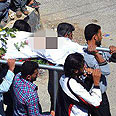
Rebels battle Syrian forces in Damascus
Syrian capital is scene of fierce fighting between Assad forces, rebels as dissidents take their fight to Assad's power center; battle claims over 43 victims including women, children
Bullets and shrapnel shells smashed into homes in the Syrian capital overnight, as troops battled rebels in the streets, in the heaviest fighting yet in Damascus. The violence marked an increased boldness among rebels in taking their fight against the regime of President Bashar Assad to the center of his power.
For nearly 12 hours of fighting that lasted into the early hours Saturday, rebels armed mainly with assault rifles fought Syrian forces. UN observers said rebels fired a rocket-propelled grenade at the local power plant, damaging parts of it and charring six buses, according to video the observers took of the scene.
Related stories:
- Syria: At least 25 killed in Deraa Annan: Syria crisis will soon spiral out of control Op-ed: Syria atrocities to go on
Syrian forces showed the regime's willingness to unleash elevated force in the capital: at least three tank shells slammed into residential areas in the central Damascus neighborhood of Qaboun, an activist said. Intense exchanges of assault-rifle fire marked the clash, according to residents and amateur videos.
At least 42 civilians were killed in violence around the country outside Damascus on Saturday, according to the Syrian Observatory for Human Rights, a Britain-based activist group. Among them were 20, including nine women and children, who died in heavy, pre-dawn shelling in the southern city of Daraa, where the uprising against Assad began in March 2011. The group's figures could not be independently confirmed.
Later Saturday, tens of thousands of Daraa residents buried the slain from the shelling. They sang, danced and paraded the dead in coffins around a large square, giving the mass funeral the appearance of a mass wedding party, according to footage of the scene.
The Damascus violence was a dramatic shift, since the capital has been relatively quiet compared with other Syrian cities throughout the uprising. Damascus, Assad's stronghold, and the northern city of Aleppo, the country's largest, are under the firm grip of security forces.
The rebels' brazenness in appearing in the Damascus districts underscored deep-seated Sunni anger against the regime, with the neighborhoods' residents risking their safety – and potentially their lives – to shelter the fighters. Residents burned tires to block the advance of Syrian troops, sending plumes of smoke into the air, according to amateur video of one scene.
Urban Sunni Syrians had once mostly stayed at arms' length from their mostly rural compatriots leading the 15-month uprising, fearing the instability that their leaderless, chaotic movement would bring.
But it appears a series of massacres of mainly Sunni peasants over the past few weeks have tipped some of their urban brethren in favor of the uprising. One rebel supporter in Qaboun said the recent mass killings made people see rebel fighters more as protectors against Assad's forces.
'Increased boldness among rebels'
"The regime has forced the rebels into the city. When they commit attacks, or massacres, or arrests, they come in to defend residents," he said.
The most recent mass killing was on Wednesday in central Syria, where activists say up to 78 people were hacked, burned and stabbed in the farming village of Mazraat al-Qubair. The opposition and regime have traded blame over the slayings.
"The psychological state of the people, after watching these massacres, is so far advanced. People are ready to do whatever it takes. They are frightened; it could come next to them," said Syria expert Joshua Landis.
The fighting was sparked in two neighborhoods, Qaboun and Barzeh, during the day Friday, when troops opened fire on anti-Assad opposition gatherings and rebels responded, witnesses said. Blasts shook the districts until about 1:30 a.m. on Saturday. In the fringe neighborhood of Kfar Souseh, fighting began after rebels attacked a Syrian forces checkpoint.
Also Saturday, troops shelled parts of the central city of Homs, one of the main battlegrounds of the uprising, and stormed into the city's posh neighborhood of Ghouta, conducting raids.
The latest escalations are another blow to international envoy Kofi Annan's peace plan, which aims to end the country's bloodletting. Annan brokered a cease-fire that went into effect on April 12 but has since been violated nearly every day since and never properly took hold.
Thousands have been killed since the crisis began in March last year. The UN's latest estimate is 9,000 dead, but that is from April and it has been unable to update it. Syrian activists put the toll at more than 13,000.
Also Saturday, the foreign minister of Assad's ally Russia said Moscow would continue to oppose the outside use of force, despite its growing concerns about the Syria conflict. Sergey Lavrov called for an international conference to galvanize commitment behind Annan's plan.
Efforts by Western and Arab nations to help the opposition have been hampered by fragmentation amid the movement. The main opposition movement, the Syrian National Council, has been plagued by infighting.
Opposition activists and Syrian government officials blamed each other for the killings. Activists accused pro-government militiamen known as "shabiha." A government statement on the state-run news agency SANA said "an armed terrorist group" killed nine women and children before Hama authorities were called and killed the attackers.
- Receive Ynetnews updates directly to your desktop











